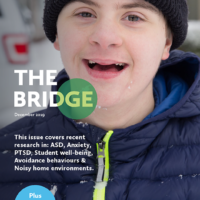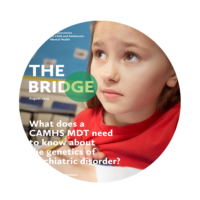Anxiety disorders
-

Most cited CAMH paper #24 of 25: A Follow‐up Study of Characteristics of Young People that Dropout and Continue Psychotherapy: Service Implications for a Clinic in the Community
Geoffrey Baruch, Ioanna Vrouva, Pasco Fearon.
Read more
Key Practitioner Message includes: Externalising problems, homelessness and being younger increase the likelihood of dropping out -

Anxiety Editorial
Owing to anxiety being common, with all of us experiencing a state of anxiety at some time and many also having trait anxiety, ACAMH journals provide good quality research advancing our knowledge of the science and evidence-based practice.
Read more -

Autism Spectrum Disorders and Obsessive Compulsive Disorder Editorial
This edition of The Bridge focusses on Autism Spectrum Disorders and Obsessive Compulsive Disorder.
Read more -

Most Popular Content of 2019
We’ve collated the most popular online content, from our website, of 2019. We would like to thank all of our collaborators who are helping us in ‘Sharing best evidence, improving practice’.
Read more -

December 2019 issue – The Bridge
Summaries include; if parental consanguinity predicts the severity of Autistic symptoms; study the transmission of intergenerational anxiety in families; systematic review into the effectiveness of available interventions to treat PTSD; the efficacy of teacher assessments vs exams to assess performance in UK schools; relationship between intolerance of uncertainty and extreme demand avoidance in young people with Autism; and how fluctuations in external environmental noise affect the developing Autonomic Nervous System in babies.
Read more -

Neuroscience Edition
Welcome to this Neuroscience themed edition of The Bridge.
Read more
The Royal College of Psychiatrists is currently promoting the neurosciences in its curriculum, for training Psychiatrists of the future. One of the many reasons for this is to develop more “Parity of Esteem” between physical and mental health conditions. -

Anxiety Disorders – Prof. Cathy Cresswell
Sorry, but you do not have permission to view this content.Read more -

In Conversation… Prof. Cathy Cresswell – Anxiety and ‘Emerging Minds’
Cathy Cresswell, Professor of Clinical Psychology, University of Oxford discusses anxiety and ‘Emerging Minds’ – action for child mental health.
Read more -

The association between anxiety and poor school attendance
School plays a key role in children’s development, and frequent absence from school increases the likelihood of a range of adverse outcomes in childhood and later life. This includes poor academic performance, social isolation, economic deprivation and unemployment in adulthood. There are many risk factors for frequent school absence, including factors related to the child and their family, school and community.
Read more -

Autism Spectrum Disorders and Obsessive Compulsive Disorder edition
This edition of ‘The Bridge’ focusses on Autism Spectrum Disorders and Obsessive Compulsive Disorder. Both of these can resemble each other with the over-focus, special interests and anxieties seen in ASD resembling the obsessions of OCD, and the routines, rituals and need for order and sameness that can be seen in ASD resembling the compulsions in OCD.
Read more